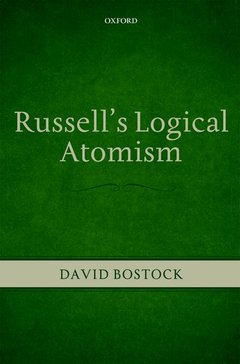Description
Russell's Logical Atomism
Author: Bostock David
Language: English
Publication date: 04-2012
314 p. · 16.1x24 cm · Hardback
314 p. · 16.1x24 cm · Hardback
Description
/li>Contents
/li>Biography
/li>
David Bostock presents a critical appraisal of Bertrand Russell's philosophy from 1900 to 1924--a period that is considered to be the most important in his career. Russell developed his theory of logic from 1900 to 1910, and over those years wrote the famous work Principia Mathematica with A. N. Whitehead. Bostock explores Russell's development of 'logical atomism', which applies this logic to problems in the theory of knowledge and in metaphysics, and was central to his philosophical work from 1910 to 1924. This book is the first to focus on this important period of Russell's development, examining the three key areas of logic and mathematics, knowledge, and metaphysics, and demonstrating the enduring value of his work in these areas.
Preface. Abbreviations. Part I: Logic and Mathematics. 1. Elementary Logic. 2. The Contradiction (i): The Problem. 3. On Denoting. 4. The Contradiction (ii): A Simple Solution. 5. The Contradiction (iii): A Ramified Solution. 6. Problems. Part II: Knowledge. 7. Acquaintance. 8. Knowledge and its Foundations. 9. Logical constructions (i): matter. 10. Logical constructions (ii): minds. 11. The Demise of Neutral Monism. Part III: Metaphysics. 12. Propositions. 13. Universals. 14. Facts. Epilogue. Concordance to Reprints of Russell's Journal Articles. References. Index.
David Bostock is Emeritus Fellow at Merton College, Oxford, where he held positions from 1968 until 2004 as Tutor in Philosophy at Merton College, and Lecturer in Philosophy at Oxford University.
© 2024 LAVOISIER S.A.S.

